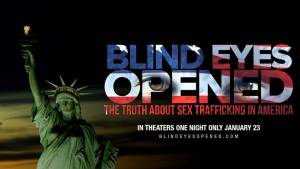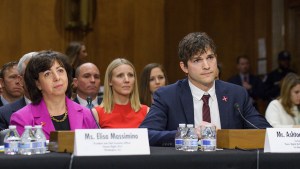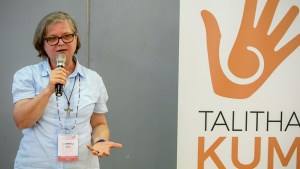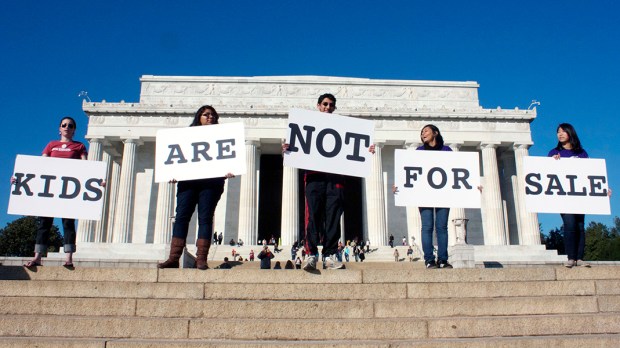Many people think of slavery as a thing of the past, but there are more people enslaved today than at any other time in world history. What’s different from the past is that many ofthese enslaved people are hidden in plain sight, perhaps in our own communities, where they’re suffering horrific exploitation in the sex industry.
UNICEF estimates that there are around 21 million trafficked people around the world, including about 5.5 million children, and the primary victims are women and girls. Human trafficking is the world’s fastest growing crime. No number can calculate the torture, suffering, and trauma these victims undergo. Enormous efforts are needed to fight the diabolical power of this massive industry.
Thankfully, there are incredible people battling on the front lines against sex trafficking. Aleteia had the chance to speak with Lina Nealon, founder of Demand Abolition and newly appointed Director of Corporate and Strategic Initiatives for the National Center on Sexual Exploitation, who shared this list of key organizations that are dedicated to ending sexual exploitation, with a special focus on saving child victims.
1National Center on Sexual Exploitation
The National Center on Sexual Exploitation (NCOSE) is “the leading national organization exposing the links between all forms of sexual exploitation such as child sexual abuse, prostitution, sex trafficking, sexual violence, and the public health harms of pornography.” While many overlook the connection between pornography and sexual exploitation, the National Center on Sexual Exploitation has made this issue a central pillar of their work.
The NCOSE team tackles all aspects of sexual exploitation, from pornography to sex trafficking to sexting, helping both child and adult victims. In particular, they are known for their work on internet safety for kids, which has been a key issue during quarantine with so many kids spending much more time online than usual.
Anyone looking to get involved with the fight against sexual exploitation can check out their annual CESE Global Summitand Youth Summit which will be offered online (for free!) starting July 18.
2Shared Hope International
Shared Hope International works to “prevent the conditions that foster sex trafficking, restore victims of sex slavery, and bring justice to vulnerable women and children.” The organization is based out of Washington, DC, but has a national focus particularly on stopping sex trafficking of children.
Shared Hope International grades states on the strength of their laws related to the commercial sexual exploitation of children, based on an annual review of state laws as analyzed under the Protected Innocence Challenge Legislative Framework. These “report cards” show that many states have made significant progress in recent years.
3Exodus Cry
Exodus Cry works to abolish sex trafficking and break the cycle of commercial sexual exploitation, while assisting and empowering its victims. Among other projects, their team has created award-winning documentaries and recently collected over 1 million signatures on a petition to “Shut Down Pornhub and Hold Its Executives Accountable for Aiding Trafficking.”

Read more:
New film unveils the truth about the sex trafficking industry
4Rights4Girls
Rights4Girls “advocates for the dignity and rights of young women and girls so that every girl can be safe and live a life free of violence and exploitation.” They coordinated the highly successful “No Such Thing” campaign, a national movement to “make clear that there is no such thing as a ‘child prostitute’—there are only victims and survivors of child rape.” Other projects include working to protect child brides and girls in foster care, with a special focus on considering the role of race, since sex trafficking victims are disproportionately girls and women of color.
5Demand Abolition
Demand Abolition works to eradicate the illegal commercial sex industry in the US by combating the demand for purchased sex. Their website says,
“Sex buyers drive the illegal sex trade. Without their money, pimps and traffickers have zero incentives. No buyers = no business.”
Their research is eye-opening, such as the “Who Buys Sex?” report. Their team works to hold sex buyers accountable for driving the entire commercial sex industry, which includes trafficking, and shifting cultural norms to one where buying people is not accepted.
6ECPAT International
ECPAT is a global network of organizations working to defend “every child’s right to live free from sexual exploitation and abuse.” Based out of Thailand, ECPAT has a special focus on engaging the travel and tourist industries in this battle through working extensively with hotels and airlines.

Read more:
Ashton Kutcher’s non-profit, Thorn, identifies and recovers victims of child sex trafficking
7World Without Exploitation
World Without Exploitation is a coalition of organizations working against sex trafficking. Their website describes their work:
Every day in America tens of thousands of people are trafficked and sexually exploited. Millions more are bought, sold, and exploited worldwide. After decades of extraordinary political, economic, and social progress, why are so many people still being purchased like products? … We’re united in the belief that we won’t end exploitation until we confront its root causes. We know that an injustice that goes unseen is an injustice that goes unchallenged. And challenging a world in which human beings are being trafficked and exploited is what World Without Exploitation is all about.
Their team recently launched “Equal Not Exploited: The Campain Against Legalized Exploitation.” Anyone looking to learn more and get involved with fighting trafficking can check out their online speaker series.
8Coalition Against Trafficking in Women
One of the oldest anti-trafficking organizations in the world, Coalition Against Trafficking In Women works to “create a world where no woman or girl is bought or sold.” To promote women’s rights and human rights principles, they advocate for strong laws and policies, raise public awareness and support survivor leadership.

Read more:
Religious sisters in the front line against human trafficking

